
Revving Up for the Electric Future: Toyota’s Bold Bid to Challenge Tesla’s Dominance
From Slow Starters to EV Powerhouse: Toyota's Aggressive Push Toward 1.5 Million BEVs Per Year by 2026
When it comes to the world of electric vehicles (EVs), one name has been at the forefront for years – Tesla. While Tesla has been zooming ahead, Toyota, a giant in the automotive industry, has been slow to embrace battery-electric vehicles (BEVs). However, recent developments suggest that Toyota is gearing up for an electrifying transformation, setting its sights on catching up with and potentially surpassing Tesla.
Earlier this year, reports indicated that Toyota was planning to venture into the production of electric SUVs at scale by 2025. The goal was to achieve a monthly production rate of 10,000 BEVs per month at a new facility in Kentucky by the end of 2025. Furthermore, Toyota aimed to churn out as many as 200,000 electric vehicles annually in the United States alone by 2026.
But the latest scoop from Nikkei Asia, shared last Saturday, reveals a seismic shift in Toyota’s electrification strategy. The Japanese automaker now plans to manufacture over 600,000 BEVs globally by 2025, effectively tripling its previous EV production targets for both the Toyota and Lexus brands, as reported by Automotive News. By 2026, Toyota envisions selling a staggering 1.5 million BEVs per year, with ambitions to reach an astounding 3.5 million annual sales by 2030.
To put this into perspective, Toyota is not only looking to catch up with Tesla but potentially outpace the EV giant in terms of production and sales volume. However, it’s a formidable challenge, considering that in 2022, Tesla sold approximately 1.31 million BEVs worldwide, dwarfing Toyota’s sales of fewer than 25,000 BEVs in the same year, including those from the Lexus brand.
This ambitious shift in Toyota’s strategy comes on the heels of an intriguing development – a Toyota executive hinted at the company’s pursuit of advanced casting techniques from other EV manufacturers. While Toyota didn’t explicitly name Tesla, it’s widely known that Tesla has pioneered the use of massive casting machines, aptly named “Giga Presses,” for production. This suggests that Toyota is willing to learn from the industry leader to leapfrog into the EV arena.
Another sign of Toyota’s changing stance is evident in its sales performance in California, a hotspot for EV adoption. In the second quarter of this year, Tesla managed to outsell Toyota in California, a feat that underscores the rising popularity of BEVs in regions across the globe.
It’s worth noting that Toyota has voiced concerns about the industry’s widespread shift towards BEVs in the past, even lobbying against them in the United States. However, with the appointment of a new CEO and former Lexus head, Koji Sato, the company appears to be embracing electric mobility more wholeheartedly.
Despite these bold moves towards BEVs, Toyota has reiterated its commitment to hydrogen fuel technology. It’s an intriguing dual strategy, with Toyota striving to excel in both the EV and hydrogen arenas. Only time will tell if Toyota’s ambitious plans will enable it to catch up with and potentially surpass the trailblazing Tesla.



